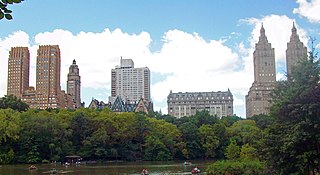Related Research Articles

A cooperative is "an autonomous association of persons united voluntarily to meet their common economic, social and cultural needs and aspirations through a jointly owned and democratically-controlled enterprise". Cooperatives are democratically controlled by their members, with each member having one vote in electing the board of directors. They differ from collectives in that they are generally built from the bottom-up, rather than the top-down. Cooperatives may include:

KF is a federation of consumer co-operatives in Sweden and a retail group, with groceries as its core business.

A housing cooperative, or housing co-op, is a legal entity, usually a cooperative or a corporation, which owns real estate, consisting of one or more residential buildings; it is one type of housing tenure. Typically housing cooperatives are owned by shareholders but in some cases they can be owned by a non-profit organization. They are a distinctive form of home ownership that have many characteristics that differ from other residential arrangements such as single family home ownership, condominiums and renting.
A mutual organization, also mutual society or simply mutual, is an organization based on the principle of mutuality and governed by private law. Unlike a cooperative, members usually do not directly contribute to the capital of the organization, but derive their right to profits and votes through their customer relationship.
Demutualization is the process by which a customer-owned mutual organization (mutual) or co-operative changes legal form to a joint stock company. It is sometimes called stocking or privatization. As part of the demutualization process, members of a mutual usually receive a "windfall" payout, in the form of shares in the successor company, a cash payment, or a mixture of both. Mutualization or mutualisation is the opposite process, wherein a shareholder-owned company is converted into a mutual organization, typically through takeover by an existing mutual organization. Furthermore, re-mutualization depicts the process of aligning or refreshing the interest and objectives of the members of the mutual society.

The Co-operative Group Limited, trading as Co-op and formerly known as the Co-operative Wholesale Society, is a British consumer co-operative with a group of retail businesses, including grocery retail and wholesale, legal services, funerals and insurance, and social enterprise.
A worker cooperative is a cooperative owned and self-managed by its workers. This control may mean a firm where every worker-owner participates in decision-making in a democratic fashion, or it may refer to one in which management is elected by every worker-owner who each have one vote. Worker cooperatives may also be referred to as labor-managed firms.
The United Kingdom is home to a widespread and diverse co-operative movement, with over 7,000 registered co-operatives owned by 17 million individual members and which contribute £34bn a year to the British economy. Modern co-operation started with the Rochdale Pioneers' shop in the northern English town of Rochdale in 1844, though the history of co-operation in Britain can be traced back to before 1800. The British co-operative movement is most commonly associated with The Co-operative brand which has been adopted by several large consumers' co-operative societies; however, there are many thousands of registered co-operative businesses operating in the UK. Alongside these consumers' co-operatives, there exist many prominent agricultural co-operatives (621), co-operative housing providers (619), health and social care cooperatives (111), cooperative schools (834), retail co-operatives, co-operatively run community energy projects, football supporters' trusts, credit unions, and worker-owned businesses.

A consumers' co-operative is an enterprise owned by consumers and managed democratically and that aims at fulfilling the needs and aspirations of its members. Such co-operatives operate within the market system, independently of the state, as a form of mutual aid, oriented toward service rather than pecuniary profit. Many cooperatives, however, do have a degree of profit orientation. Just like other corporations, some cooperatives issue dividends to owners based on a share of total net profit or earnings ; or based on a percentage of the total amount of purchases made by the owner. Regardless of whether they issue a dividend or not, most consumers’ cooperatives will offer owners discounts and preferential access to goods and services.

The Midcounties Co-operative Limited, trading as Your Co-op, is a consumer co-operative in the United Kingdom with over 700,000 members. Registered in England under the Co-operative and Community Benefit Societies Act 2014, it is a member of Co-operatives UK and Federal Retail Trading Services.
A food cooperative or food co-op is a food distribution outlet organized as a cooperative, rather than a private or public company. Food cooperatives are usually consumer cooperatives, where the decisions regarding the production and distribution of its food are chosen by its members. Like all cooperatives, food cooperatives are often based on the 7 Rochdale Principles, and they typically offer natural foods. Decisions about how to run a cooperative are not made by outside shareholders, therefore cooperatives often exhibit a higher degree of social responsibility than their corporate analogues.

Cooperative banking is retail and commercial banking organized on a cooperative basis. Cooperative banking institutions take deposits and lend money in most parts of the world.

Cooperativeeconomics is a field of economics that incorporates cooperative studies and political economy toward the study and management of cooperatives.
The history of the cooperative movement concerns the origins and history of cooperatives across the world. Although cooperative arrangements, such as mutual insurance, and principles of cooperation existed long before, the cooperative movement began with the application of cooperative principles to business organization.

The South Korean National Agricultural Cooperative Federation was established in 1961 to enhance the social and economic status of its membership and to promote a balanced development of the national economy. Its role is divided into three areas: marketing and supply, banking and insurance, and extension services.
Economic democracy is a socioeconomic philosophy that proposes to shift ownership and decision-making power from corporate shareholders and corporate managers to a larger group of public stakeholders that includes workers, consumers, suppliers, communities and the broader public. No single definition or approach encompasses economic democracy, but most proponents claim that modern property relations externalize costs, subordinate the general well-being to private profit and deny the polity a democratic voice in economic policy decisions. In addition to these moral concerns, economic democracy makes practical claims, such as that it can compensate for capitalism's inherent effective demand gap.
A platform cooperative, or platform co-op, is a cooperatively owned, democratically governed business that establishes a two-sided market via a computing platform, website, mobile app or a protocol to facilitate the sale of goods and services. Platform cooperatives are an alternative to venture capital-funded platforms insofar as they are owned and governed by those who depend on them most—workers, users, and other relevant stakeholders.
References
- ↑ "Cooperatives of the Americas - Coop News". www.aciamericas.coop. Retrieved 2020-10-01.
- ↑ Boyle, Dave. "Good News: A Co-operative Solution to the Media Crisis" (PDF). Good News - downloadable PDF. Co-operatives UK. Retrieved 10 June 2020.
- ↑ Andrew Bibby (2013-09-25). "Stop the press ... and make way for the co-op media". the Guardian. Retrieved 2016-07-17.
- ↑ "About" . Retrieved 2016-07-17.
- ↑ Kaiser, Jo Ellen Green (2019-02-02). "Media Cooperatives: Challenges and Opportunities". Medium. Retrieved 2019-12-07.